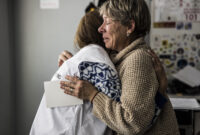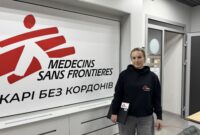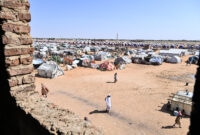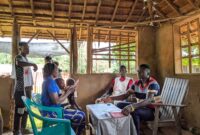MSF updates on anti-racism
Doctors Without Borders/Médecins Sans Frontières (MSF) is a medical humanitarian movement that works with communities affected by crises to provide medical care to people who need it most, regardless of race or ethnicity. Every day we witness the impact of violence directed toward people who are targeted or denied access to care simply because of who they are. We are an organization that provides care to people who are systematically targeted, discriminated against, and excluded.
With George Floyd’s killing and the events since, we have been shockingly reminded once again of what is the daily reality for black people in North America and racialized people around the world: that racism exists all around us, with very real effects on health and lives.

Update on MSF Canada’s Work to Dismantle Systemic Racism Within Our Organization
Published on: September 20, 2021.
Last year, we shared that MSF Canada had launched a long-term vision and roadmap to embed the principles of Equity, Diversity and Inclusion (EDI) and Anti-Oppression Anti-Racism (AOAR) into our work. This effort was an important step in acknowledging the legacy of racism and colonialism within MSF and our sector, and identifying and dismantling the systems and practices that perpetuate discrimination and inequity in our organization. Today, we want to take a moment to reflect on our ongoing transformational efforts and the critical work that must still be done to be the MSF we need to be.
We recognize and reaffirm the need for anti-racism and EDI to be integrated into everything we do, so it is at the center of all our operations, communications, advocacy, fundraising, executive leadership and human resources activities. It is with that spirit that we developed our long-term EDI vision and roadmap, which includes concrete and measurable targets that will keep us accountable and impact all aspects of our work and policies. Some of these targets include ensuring MSF Canada’s composition, including at the senior management level, is more representative of the ethno-cultural diversity of Canada; that staff including those deployed to our places of medical operation increase their understanding of anti-racism and anti-oppression; and that MSF Canada actively contributes to advancing action across the MSF movement globally.
Actions taken to date to get us closer to these goals include:
- Raising deep staff awareness and strengthening practices related to EDI, anti-racism and anti-oppression including through ongoing trainings, workshops, lunch & learns, personal development, coaching and courses with an emphasis on employees in management positions. Additionally, we are releasing monthly podcasts and inviting expert speakers to help improve our understanding of the colonial and racist foundations of the humanitarian sector specifically. Today, departments are also working more closely with MSF Canada’s EDI Advisor and Committee to better integrate EDI practices in our everyday work.
- Partnering with Indigenous-led organizations to develop a cultural safety strategy and deliberately challenge settler colonialism. As an organization based in Canada, we acknowledge that we benefit from settler colonialism and as such we choose to partner with Indigenous educators and consultants to increase our anti-colonial awareness and establish an organizational anti-colonial strategy.
- Increasing representation of historically marginalized communities, particularly in leadership positions with recruitment processes that more intentionally attract and retain a more representative pool of candidates. These include, for example: anonymous reviews of assessments, interviewer bias training, more representative interview panels, and reviewing job description criteria to emphasize lived experiences. All new-staff onboarding also includes EDI briefings and an EDI starter kit.
- Supporting workforce equity within MSF, including by joining an international working group reviewing salaries and compensation in MSF and advocating for more equity across all contract types and employee groups. As a host of the Telemedicine program, MSF Canada is also deliberate about removing barriers to access to telemedicine across all staff. Similarly, the Transformational Investment Capacity (TIC) program hosted by MSF Canada has also undertaken efforts to ensure geographic representation and draw transformational initiatives from underrepresented entities of MSF.
- Contributing to various international projects in MSF to create awareness about our joint accountabilities to anti-racism and EDI across the MSF movement. For example, MSF Canada is the co-sponsor of a transformative anti-racism project that aims to build deeper learning and action on this topic within MSF globally. We are also currently documenting challenges, learnings and best practices with the intent to share recommendations to all MSF sections in order to sustain and accelerate our EDI efforts.
- Reviewing and revising our communications content to uphold anti-racist and anti-colonial narratives, including by reviewing previously-published materials with an EDI lens, removing photos that do not uphold our values and institutionalizing a new lexicon that provides alternatives to humanitarian terminology that are rooted in colonial histories. We are also now in the process of updating MSF Canada’s brand guidelines to uphold dignified representations of the communities we serve.
- Transforming our International General Assembly composition to equitably represent the movement globally and ensure effective global governance, including through various initiatives within our associative movement. Last November, MSF Canada put forward a motion to review the composition of the International General Assembly and allow for equitable representation of all MSF associations.
- Joining the Cooperation Canada Anti-Racism Framework in March 2021 to corroborate and strengthen indicators from our EDI roadmap that will help us continuously assess our progress on anti-racism. Joining this initiative also provides MSF Canada the opportunity to keep engaging with and learning from a community of practice with a commitment to anti-racism.
We are proud of this work, and deeply grateful to the staff, association members and supporters who have shared their recommendations, asked questions and challenged us along the way. Thank you all for your dedication, wisdom and hard work in this direction.
We also continue to hear colleagues who have spoken out internally and externally about racism within MSF’s global movement. We unequivocally reaffirm that racism and discrimination have no place in our organization, and encourage anyone who has experienced or witnessed abuse to report it through our reporting hotline.
Dismantling systemic racism will continue to require all of us, and there is much work still to be done. We are unreservedly committed to continue using our voice at MSF Canada for change within the movement. We will continue to speak out, listen and hold ourselves accountable to the hard work it takes to build a stronger, anti-racist and more inclusive MSF for all.
Sincerely,
Joe Belliveau, Executive Director, MSF Canada
Ruby Gill, Board President, MSF Canada

Public Statements:
Web statement about DRTV – September 10, 2020.
MSF Canada takes very seriously the accounts of racism experienced by staff and members, as described in the Guardian news article posted online on September 10. We hold the responsibility to create an organization free of discrimination and racism. Considerable effort has gone into these changes in the past few years, but we are conscious that much more needs to be done.
The article focuses on a Direct Response TV (DRTV) video pilot tested as part of our fundraising program in 2019 which had been used for fundraising purposes in other countries since 2010. MSF Canada pulled the ad, during the four-week test in June 2019 as a result of the concerns raised about images that portrayed racialized power imbalances that we are working to change in our organization. In July 2019 MSF Canada commissioned an evaluation of the DRTV process, which brought forward important issues and recommendations, particularly related to trust-building and creating safe spaces for dialogue.
We believe this DRTV advert and the follow up evaluation were a significant turning point for our organization. These not only helped us better understand how outdated images and messaging reinforce structural racism, they helped us refocus the work we had previously initiated on diversity, inclusion and anti-racism in the workplace, which led to a period of significant change for the organization. This change is also a central goal in MSF Canada’s 2020-2023 Strategic plan which describes the organization’s strategic vision for the next three years.
In this process of understanding and dismantling systemic racism, MSF Canada is committed to building a culture of trust based on humanity, transparency, and accountability. As part of its accountability, the Board of Directors has commissioned an independent investigation into the Board’s leadership in response to complaints and will hold a special general assembly in the fall. We are grateful to our members and staff who have spoken up and continue to contribute to these conversations. We acknowledge these much-needed changes are a work-in-progress, and that we still have much work ahead to become the organization we want to be.

Statement from MSF Canada Management Team and Board of Directors on racism in the workplace
August 24, 2020.
The Management Team and Board of Directors at MSF Canada was very concerned by the accounts of racism experienced by a past employee who worked in our office, published in this article. We are deeply sorry for what Arnab Majumdar – and others who have or are still experiencing similar – went through. It is our responsibility to create a safe working environment free of discrimination and racism. We take this extremely seriously and are deeply committed to changing the culture, practices and structures that allowed Arnab’s and other’s experiences to occur. We are currently planning next steps and reviewing long-term goals with the engagement staff, the Management Team and Board of Directors.
We are committed to fostering a work culture where everyone is encouraged to share their experiences in a safe environment and reaffirm our commitment to Equity, Diversity and Inclusion (EDI), anti-racism/anti-oppression, and Responsible Behaviour. Over the past two years, the Management Team, the Human Resources department, our EDI Committee and many members of our staff have invested time and energy to co-create a workplace culture that integrates EDI, anti-racism/anti-oppression and Responsible Behaviour into our daily work. Some of the changes we have initiated are listed below, however we acknowledge that this is a work-in-progress and that we still have much work ahead:
- Developing a long-term EDI vision and roadmap with measurable targets that will impact all levels and all aspects of our work and policies, working toward the integration of EDI across every aspect of our work.
- Raising awareness and education: we will continue developing and systematizing trainings on EDI and anti-racism/anti-oppression for all staff. We are releasing monthly podcasts on a variety of topics (such as ‘EDI in the workplace culture’ and ‘the colonial mindset in global health’), host lunch & learns, and offer personal development, coaching or courses with emphasis on employees in management positions. Various keynotes speakers and experts have been invited to improve our understanding of the impact of the colonial roots and systemic racism of the aid sector.
- Integration in our policies: HR material and policies have been adapted to apply an anti-racism / anti-oppression and EDI approach.
- Increased representation of historically marginalized communities: we are working to change our recruitment practices to increase the representation of historically marginalized communities, particularly at the leadership level. These include, for example: postings with the aim to attract a more representative pool of candidates; anonymous reviews of assessments; introducing interviewer bias training for panelists; reviewing criteria used in job descriptions, for example by changing educational requirements to emphasize more lived experiences; and a new-staff onboarding that includes EDI briefings and an EDI starter kit.
- Contributing to an international project in MSF to document and analyze initiatives and create recommendations to sustain EDI efforts across the MSF global organization.
These are some initial steps and we know our work is far from done. As the Management Team and Board of Directors, we are committed to evolve our culture, practices, and policies, working toward creating an anti-racist MSF Canada and an environment where we can share our experiences in a safe and respectful workplace.

MSF Executive Directors’ statement on racism
Dear All,
The global shockwave initiated by the killing of George Floyd has led many organizations to take a hard and honest look at their level of progress on fighting racism and discrimination. In undertaking that assessment ourselves – and despite years of raising awareness and efforts at implementing new policies – we acknowledge that progress is nowhere fast enough. We also acknowledge that our governance, and where the positions of power sit in our movement, don’t reflect the diversity of our organization.
As the Core ExCom, we welcome the current debate on racism as an opportunity to accelerate change within our organization. Pain and suffering have been expressed in recent weeks across the movement, these words reflect the reality of so many of our staff, and patients.
The strategic plans of the five Operational Centres, published just a few months ago, include strong commitments on diversity, equity and inclusion, as well as on challenging the concentration of power in Europe. We believe these are important steps in tackling racism within MSF. We are all working to transform these commitments into action and reality. We will develop clear milestones on these actions and ensure we are held accountable to the boards, staff, associative members, donors and patients on the progress we make at every step.
However, we know that these changes need to go much further to provide a more just and equitable environment to our staff. We also need to examine how the inequalities we see in our organization influence the care we provide to patients and our transparency towards them.
We need to go further in understanding and addressing the existing biases and barriers that exist within MSF. Some are rooted in our processes; others within the cultures of the places where decisions are made and implemented, which then shapes our behaviour and ways of thinking. Many are the result of history. Founded in Europe, MSF practices and structures are not immune from the influence of the continent’s colonizing past. We need to address these issues head on, however uncomfortable, and even painful, this may be for those currently making decisions.
We are very conscious that the vast majority of the General Directors appointed by our associations are of European descent, which limits our ability to identify the extent of our own biases and provide truly diverse perspectives for leading our movement. We are also aware that racism is not the only problem we face; we see discrimination based on gender, religion, sexuality and social standing.
We must undertake changes throughout the organisation, which will include:
- Breaking the glass ceiling for locally-hired staff;
- addressing the difference in compensation in our teams;
- reviewing the varying level of risk taken by staff;
- continuing to tackle the broader issues of harassment, abuse and discrimination throughout the organization, specifically focusing on the patients we treat to ensure they can truly be protected from – and report on – possible abuse perpetrated by MSF staff; and
- critical assessment of any medical double standards that may exist, for example when reduced level of quality of care becomes a norm in numerous countries where we operate.
As the Core Executive Committee, we commit to lead the way for the radical action sought after and demanded by our associations. We commit to propose and implement reforms allowing the rich diversity of the global MSF movement to be mirrored in the composition of our international governance, both associative and executive. This will lead MSF to become an ever more diverse, equitable, just and global organization, where everyone can contribute to tomorrow’s definition of medical humanitarian action.
Nelke Manders, General director MSF-Holland, Chair of the OCA Meinie Nicolai, General Director, MSF OCB Marta Cañas, General Director, MSF OCBA, MSF España Thierry Allafort-Duverger, General Director, MSF France Liesbeth Aelbrecht, Director General, OCG Jeremie Bodin, General Director, MSF Japan Erwin van’t Land, General Director, MSF Norway Christopher Lockyear, Secretary General, MSF International
Core ExCom: the core members of MSF’s Executive Committee (ExCom) are the General Directors of the five MSF Operational Centres (Amsterdam, Barcelona, Brussels, Geneva, Paris), plus two members elected from amongst the General Directors of the MSF Partner Sections, plus the International Medical Secretary at MSF International. The core ExCom is chaired by the Secretary General of MSF International.

Article by Dr. Africa Stewart, President of the Board of Directors of MSF USA.
MSF’s public voice is normally reserved for decrying the brutality or deliberate neglect that brings patients into our medical tents and hospitals. In the current circumstances, though we are not treating the wounded, we resolutely stand in solidarity and in support of our friends, our colleagues, our families, our patients, and our communities who are adversely impacted. Please take a moment to read the following article by Dr. Africa Stewart, President of the Board of Directors of MSF USA.
Standing in solidarity with our black colleagues and the black community in the United States
For me, this is personal. No matter how good I am as a doctor, mother, wife, and human being, I can instantly be reduced to one simple word: black – and be judged as that alone. I was taught to work twice as hard and be twice as strong, but it never adds up to being safe in my existence.
The recent killings of George Floyd, Breonna Taylor, and Ahmaud Arbery have ignited outrage over the deadly impact of racism against black people in the United States. For me and my family, for black friends and colleagues, the heartbreaking reality is that this is normal. We live with some measure of fear and uncertainty every day.
Racism is a public health crisis. We have seen the shocking reports that the COVID-19 mortality rate for black people in the US is more than twice as high as the rate for white people. This research estimates that if the mortality rates were equal, some 13,000 black people would still be alive today.
Doctors Without Borders/Médecins Sans Frontières (MSF) provides lifesaving medical humanitarian aid around the world and is known for speaking out. Right now, we are listening. And we are taking a hard look at how to confront racism and discrimination within our organization, in the US, and in the world.
MSF provides aid to the people who need it most, regardless of race or ethnicity. But we know all too well how racism can cause deadly harm. We see patients every day who are victims of targeted attacks or who are denied access to health care simply because of who they are. We provide mental health care for victims of trauma, abuse, and persistent discrimination.
We don’t usually run humanitarian operations in the US, but these are unusual times. This spring, we launched temporary operations in the US in response to the unprecedented COVID-19 pandemic. Our aim is to serve vulnerable communities with limited access to health care. It is no coincidence that many of our projects are serving communities of color – including in New York City, Detroit, Puerto Rico, and working with Native Americans of the Southwest. The racial disparities in access to health care were here long before the pandemic hit, and long before we arrived on the scene. We are listening to community-based health organizations and local health workers to understand what the needs are and how best to respond.
All of us at MSF-USA stand in solidarity with our black colleagues and the black community. We are committed to listening, learning, and taking action against racism. We all must do more to ensure that black lives and health are protected.
Silence is violence – and I won’t be part of that.
Black lives matter.
In solidarity,
Dr. Africa Stewart
President of the Board of Directors for MSF-USA










